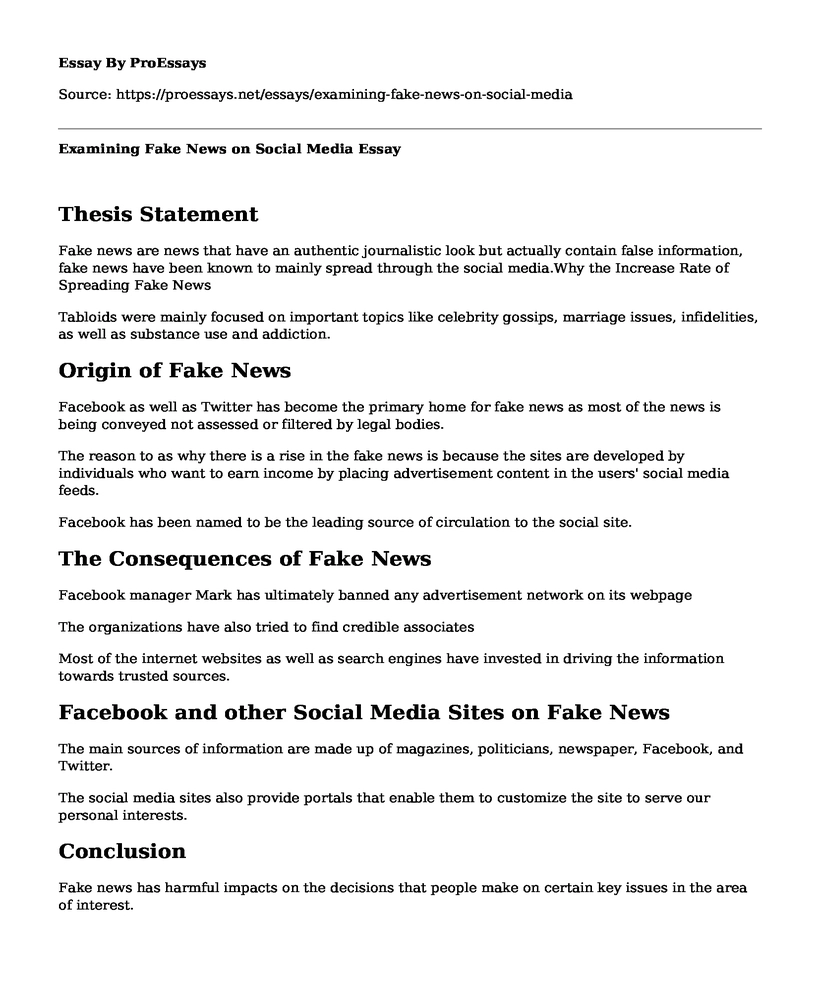Thesis Statement
Fake news are news that have an authentic journalistic look but actually contain false information, fake news have been known to mainly spread through the social media.Why the Increase Rate of Spreading Fake NewsTabloids were mainly focused on important topics like celebrity gossips, marriage issues, infidelities, as well as substance use and addiction.
Origin of Fake News
Facebook as well as Twitter has become the primary home for fake news as most of the news is being conveyed not assessed or filtered by legal bodies.
The reason to as why there is a rise in the fake news is because the sites are developed by individuals who want to earn income by placing advertisement content in the users' social media feeds.
Facebook has been named to be the leading source of circulation to the social site.
The Consequences of Fake News
Facebook manager Mark has ultimately banned any advertisement network on its webpage
The organizations have also tried to find credible associates
Most of the internet websites as well as search engines have invested in driving the information towards trusted sources.
Facebook and other Social Media Sites on Fake News
The main sources of information are made up of magazines, politicians, newspaper, Facebook, and Twitter.
The social media sites also provide portals that enable them to customize the site to serve our personal interests.
Conclusion
Fake news has harmful impacts on the decisions that people make on certain key issues in the area of interest.
The belief in friends and self also helps promote the spread of fake information from one source to the consumers in different parts of the world.
The availability of many information sources is very critical in the confusion that makes people come into contact with fake news
Works Cited
"Fake News on Social Media." Opposing Viewpoints Online Collection, Gale, 2017. Opposing Viewpoints in Context, link.galegroup.com/apps/doc/OBOYIA996440220/ OVIC?u=24011&xid=a085bb33. Accessed 30 June 2017.
Forestal, Jennifer, and Menaka Philips. "People blame Facebook for fake news and partisan bile. They're wrong." Washington Post, 16 Dec. 2016. Opposing Viewpoints in Context, link.galegroup.com/apps/doc/A474063336/OVIC?u=24011 &xid=b3ee5bbb. Accessed 30 June 2017.
Sundar, S. Shyam. "Social Media Users Must Start Checking Online News Sources." Opposing Viewpoints Online Collection, Gale, 2017. Opposing Viewpoints in Context, link.galegroup.com/apps/doc/KCQRIU467955724/OVIC?u=24011&xid=fc 7fc3ed. Accessed 30 June 2017. Originally published as "Why do we fall for fake news?" The Conversation, 7 Dec. 2016.
Heer, Jeet. "Voters Use Fake News to Justify Their Support for Undesirable Candidates." Opposing Viewpoints Online Collection, Gale, 2017. Opposing Viewpoints in Context, link.galegroup.com/apps/doc/LLXGTE632164920/OVIC?u= 24011&xid=d2defed2. Accessed 30 June 2017. Originally published as "Fake News Isn't the Problem," New Republic, 18 Nov. 2016.
Barthel, et al. http://www.journalism.org/2016/12/15/many-americans-believe-fake-news-is-sowing-confusion/. 15 December 2016. web. 10 October 2017.
Cite this page
Examining Fake News on Social Media. (2022, Mar 31). Retrieved from https://proessays.net/essays/examining-fake-news-on-social-media
If you are the original author of this essay and no longer wish to have it published on the ProEssays website, please click below to request its removal:
- Child Crisis Arizona: Speech
- Current Views on Technology and Social Media Influences Essay
- The Influence of Social Media on Teen's Self Esteem Paper Example
- Research Paper on Hulu Company
- Girls Like Girls: Hayley Kiyoko's Dance-Pop Anthem for LGBT Community
- Essay Example on Transformational Leadership: Achieving the Unimaginable
- Shameless - Essay Example







